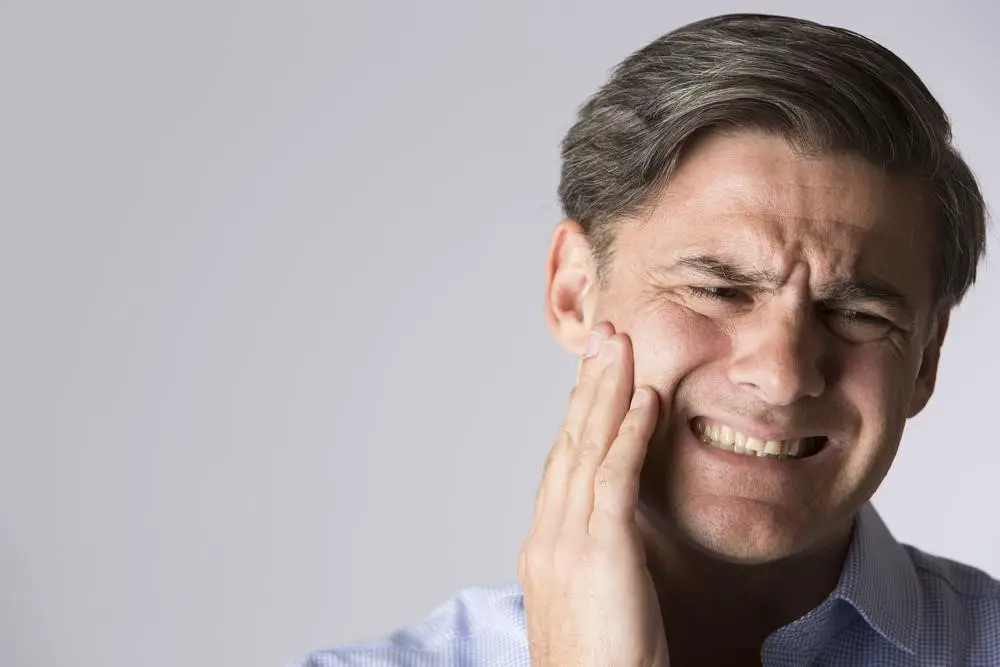A jaw pain is a common symptom which can be caused by various diseases. For example, there is stress and fatigue. They are responsible for tension in the jaw. In this article, we will talk about the link between jaw pain and stress.
Definition and anatomy
A jaw pain is a very common sign that can occur in many situations. Often described as throbbing and uncomfortable, it is characterized by discomfort or pain localized at jaw level.
This pain may or may not be associated with cracking and blocking when opening and closing the mouth. Depending on the etiology, it can also be accompanied by pain in the face, head, ear and neck (cervical tension). In some cases, the pain is localized specifically at the level of thetemporomandibular joint.
Remember that in humans, the jaw made of of two bones,maxillary bone above and mandible below. Together, these form the temporomandibular joint (TMJ). The mandible, in the shape of a horseshoe, ends on each side of the face in a condyle which articulates in the temporal bone. The joint itself is divided into two sections by an articular disc formed from fibrocartilage.
ATM opens and closes the mouth, to slide up and down and sideways. There are two located on each side of the face, just in front of the ears.
If you want to know more about jaw pain, I invite you to click here.
Symptoms of jaw pain
De many other symptoms Peuvent être associated with pain in the jaw. These symptoms basically depend on the underlying cause of the discomfort. We can cite for example:
- headaches (headaches);
- difficulty chewing or swallowing;
- swelling of the gums;
- swelling of the jaw or face;
- pain in the face, ear and neck (cervical tension)…
Common causes of jaw pain
Whether sudden and brutal or gradual and insidious, jaw pain is never pleasant.
However, it should be understood that the causes of pain to the jaw are very diverse. Among the most common are the so-called “biomechanical” causes, those that affect the bones, ligaments or muscles of the jaw. In this category we have:
- dislocation of the jaw, also called dislocation;
- broken bones;
- le bruxism, which refers to grinding or clenching of the teeth, often occurring during sleep;
- dental malocclusion (when the upper and lower teeth do not fit together properly);
- poor fit of a dental prosthesis;
- osteoarthritis in the jaw joint;
- le Algo-dysfunctional syndrome of the masticatory apparatus ( SADAM) which affects the temporomandibular joint…
- A bad position of the teeth can cause an imbalance between the mandible (lower jaw) and the maxilla (upper jaw). As a result, there is painful chewing or blockage of the jaw.
Some inflammatory pathologies ou infectious can also give pain in the jaw:
- rheumatoid arthritis;
- synovitis;
- dental abscess;
- tetanus;
- mumps: a contagious viral infection that causes the side of the mouth to swell, causing pain and difficulty in jaw movement)…
Le stress and I'anxiety can also cause contractures in the jaw and therefore pain.
How stress can cause jaw pain ?
Le stress is a set of physical reactions et body physiological faced with a particular situation.
Beyond the feeling of ill-being that one can feel when one is stressed, the consequences on health are not negligible. The body is programmed to react to a stressful situation, by releasing hormones, maintaining an attitude of hypervigilance, increasing muscle tension...
All of these reactions can cause muscle tension, especially the masticatory and elevator muscles of the mandible (temporal muscle, masseter muscle, and pterygoid muscle). This is what causes a jaw pain when stressed.
What are the harmful effects of stress ?
Le stress not only affects the Mental Health, but also the physical health. This results in particular in an increase in muscle tension, an increase in the sensitivity of the nerves, or even a total loss of control. When these anxiety-provoking situations set in, our body continually lives in a defense mode. The consequences of stress can then be disastrous.
Un persistent stress can also affect the immune system (by reducing the body's defense mechanism). In normal times, our body has the necessary resources to fight against the viruses and aggressions that threaten us on a daily basis. But when we are stressed, especially if it is chronic, the body is too busy fighting the immediate threat so that we become very vulnerable to infections.
In the context of stress-related jaw pain, if neglected, it may cause the jaw blockage.
What to do then ?
Treating the Cause of Jaw Pain
Le pain treatment in the jaw will depend on the disease that is the source.
Often, temporary pain relief can be achieved by taking painkillers (analgesics, anti-inflammatory). It is also possible toapply warm compresses to the jaw, temples and neck for 10 to 12 minutes about twice a day. It is effective in relaxing muscles and decreasing symptoms by promoting blood supply to the affected area.
It is also recommended to eat liquid foods or easy-to-chew foods (yogurt, soup, mashed potatoes, scrambled eggs, compotes, etc.) for a few days. It is also better avoid excessive jaw movements such as yawning or chewing gum. This kind of movement reduces the stress on the articular structures.
In addition to medical care, also think about alternative medicine.
- Self-massage: a light massage of the muscles of the jaw and the temples (in circular movements while opening and closing the jaw slowly for about thirty seconds), can stretch the muscle fibers, promote muscle relaxation and reduce pain.
- Magnesium: Disorders of the temporomandibular joint can be caused by magnesium deficiency. Magnesium-rich foods can help relax muscle tension that causes jaw spasms (spinach, almonds, black beans, avocado, bananas, etc.).
- Foods rich in omega-3 can also help the body through their anti-inflammatory action.
Manage stress to avoid jaw pain
La stress management is something that you can implement by your own well-being. First, it consists of a awareness of your condition. It will then be necessary adopt moderating measures against stress.
You have several options: doing yoga, meditation, relaxation, controlled breathing, etc. All of these activities help regulate the body's physiological functions and bring emotional relief.





